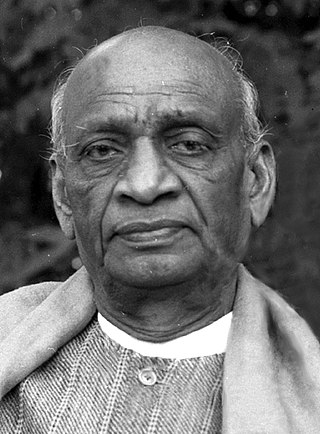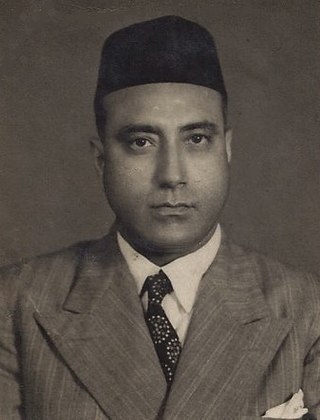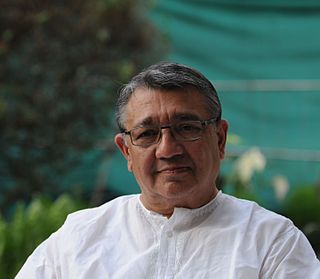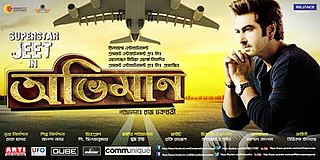
Jawaharlal Nehru was an Indian anti-colonial nationalist, statesman, secular humanist, social democrat, and author who was a central figure in India during the middle of the 20th century. Nehru was a principal leader of the Indian nationalist movement in the 1930s and 1940s. Upon India's independence in 1947, he served as the country's first prime minister for 16 years. Nehru promoted parliamentary democracy, secularism, and science and technology during the 1950s, powerfully influencing India's arc as a modern nation. In international affairs, he steered India clear of the two blocs of the Cold War. A well-regarded author, his books written in prison, such as Letters from a Father to His Daughter (1929), An Autobiography (1936) and The Discovery of India (1946), have been read around the world.

Vallabhbhai Jhaverbhai Patel, commonly known as Sardar Vallabhbhai Patel, was an Indian independence nationalist and barrister who served as the first Deputy Prime Minister and Home Minister of India from 1947 to 1950. He was a senior leader of the Indian National Congress, who played a significant role in the country's struggle for independence and its political integration. In India and elsewhere, he was often called Sardar, meaning "Chief" in Hindi, Urdu, Bengali and Persian. He acted as the Home Minister during the political integration of India and the Indo-Pakistani War of 1947.

Ram Chandra Kak was the prime minister of Jammu and Kashmir during 1945–1947. One of the very few Kashmiri Pandits to ever hold that post, Kak had the intractable job of navigating the troubled waters of the transfer of power from British Raj to the independent dominions of India and Pakistan.
Bengali Brahmos are those who adhere to Brahmoism, the philosophy of Brahmo Samaj which was founded by Raja Rammohan Roy. A recent publication describes the disproportionate influence of Brahmos on India's development post-19th Century as unparalleled in recent times.
The three Round Table Conferences of 1930–1932 were a series of peace conferences organized by the British Government and Indian political personalities to discuss constitutional reforms in India. These started in November 1930 and ended in December 1932. They were conducted as per the recommendation of Muhammad Ali Jinnah to Viceroy Lord Irwin and Prime Minister Ramsay MacDonald, and by the report submitted by the Simon Commission in May 1930. Demands for Swaraj or self-rule in India had been growing increasingly strong. B. R. Ambedkar, Jinnah, Sir Tej Bahadur Sapru, V. S. Srinivasa Sastri, Sir Muhammad Zafrulla Khan, K. T. Paul and Mirabehn were key participants from India. By the 1930s, many British politicians believed that India needed to move towards dominion status. However, there were significant disagreements between the Indian and the British political parties that the Conferences would not resolve. The key topic was about constitution and India which was mainly discussed in that conference. There were three Round Table Conferences from 1930 to 1932.

Indian nationalism is an instance of territorial nationalism, which is inclusive of all of the people of India, despite their diverse ethnic, linguistic and religious backgrounds. Indian nationalism can trace roots to pre-colonial India, but was fully developed during the Indian independence movement which campaigned for independence from British rule. Indian nationalism quickly rose to popularity in India through these united anti-colonial coalitions and movements. Independence movement figures like Mahatma Gandhi and Jawaharlal Nehru spearheaded the Indian nationalist movement. After Indian Independence, Nehru and his successors continued to campaign on Indian nationalism in face of border wars with both China and Pakistan. After the Indo-Pakistan War of 1971 and the Bangladesh Liberation War, Indian nationalism reached its post-independence peak. However by the 1980s, religious tensions reached a melting point and Indian nationalism sluggishly collapsed. Despite its decline and the rise of religious nationalism; Indian nationalism and its historic figures continue to strongly influence the politics of India and reflect an opposition to the sectarian strands of Hindu nationalism and Muslim nationalism.

Jivatram Bhagwandas Kripalani, popularly known as Acharya Kripalani, was an Indian politician, noted particularly for holding the presidency of the Indian National Congress during the transfer of power in 1947 and the husband of Sucheta Kripalani. Kripalani was an environmentalist, mystic and independence activist who was long a Gandhian socialist, before joining the economically right wing Swatantra Party later in life.

Vappala Pangunni Menon was an Indian civil servant who served as Secretary to the Government of India in the Ministry of the States, under Sardar Patel. By appointment from Viceroy and Governor-General of India Wavell, he also served as Secretary to the Governor-General (Public) and later as Secretary to the Cabinet. He also was the Constitutional Adviser and Political Reforms Commissioner to the last three successive Viceroys during British rule in India. In May 1948, at the initiative of V. P. Menon, a meeting was held in Delhi between the Rajpramukhs of the princely unions and the States Department, at the end of which the Rajpramukhs signed new Instruments of Accession which gave the Government of India the power to pass laws in respect of all matters that fell within the seventh schedule of the Government of India Act 1935.
Hirubhai Mulljibhai Patel CIE was an Indian civil servant who played a major role in the issues regarding internal and national security in the first years after the independence of India. From 1977 to 1979, he served as the Finance Minister and later Home Minister of India. He was also the chairman of the Charutar Vidya Mandal, which founded Vallabh Vidyapith that was later on named as Sardar Patel University, Vallabh Vidyanagar

Before India gained independence in 1947, India was divided into two sets of territories, one under direct British rule, and the other consisting of princely states under the suzerainty of the British Crown, with control over their internal affairs remaining in the hands of their hereditary rulers. The latter included 562 princely states which had different types of revenue-sharing arrangements with the British, often depending on their size, population and local conditions. In addition, there were several colonial enclaves controlled by France and Portugal. After independence, the political integration of these territories into an Indian Union was a declared objective of the Indian National Congress, and the Government of India pursued this over the next decade.

Sardar is a 1993 Indian biographical drama film on Sardar Vallabhbhai Patel, one of India's greatest freedom fighters, directed by Ketan Mehta and written by noted playwright Vijay Tendulkar and Hriday Lani. The film was screened retrospective on 12 August 2016 at the Independence Day Film Festival jointly presented by the Indian Directorate of Film Festivals and Ministry of Defence, commemorating 70th Indian Independence Day.

In February 1948, the princely state of Junagadh, located in what is now the Indian state of Gujarat, was annexed to the Union of India after a dispute with the Dominion of Pakistan, regarding its accession, and a plebiscite.

Arun Bhatnagar is a former Indian Administrative Service (IAS) officer of the 1966 batch of the Madhya Pradesh cadre who has served in various capacities in the State and with the Government of India. Bhatnagar retired from the IAS in June, 2004 as Secretary, Department of Personnel and Training and worked, thereafter, as Secretary, National Advisory Council (2004–08) and Chairman, Prasar Bharati (2008–09) at New Delhi.

Abhimaan is a 2016 Indian Bengali-language action comedy drama film directed by Raj Chakraborty and starring Jeet, Subhashree Ganguly and Sayantika Banerjee. The movie was released in India on 6 October 2016 and in Bangladesh on 30 December 2016.

The Kheda Satyagraha of 1918 was a satyagraha movement in the Kheda district of Gujarat in India organised by Mahatma Gandhi during the period of the British Raj. It was a major revolt in the Indian independence movement. It was the second Satyagraha movement, which was launched 7 days after the Ahmedabad mill strike. After the successful Satyagraha conducted at Champaran in Bihar, Gandhi organised the movement to support peasants who were unable to pay the revenue because of famine and plague epidemic.
Anupama Jain is a writer and teacher based out of Gurgaon, India. She is the founding member of Senior School Moms and a blogger. Anupama is the author of 4 well-received books and 12 anthologies across genres, one of which is a LIMCA record holder as India’s first Composite Novel. She is an acclaimed community builder, mentor, and multi-award-winning blogger who pens on the vagaries of the quirky world across various coveted forums.

Awakening Bharat Mata: The Political Beliefs of the Indian Right is a literary collection by Swapan Dasgupta, published by Penguin Random House in 2019. The book is about the rise and beliefs of right-wing politics in India.

The Border Peace and Tranquility Agreement is an agreement signed by China and India in September 1993, agreeing to maintain the status quo on their mutual border pending an eventual boundary settlement. The Agreement on Military Confidence Building Measures, 1996, pursuant to the 1993 agreement, incrementally details the military confidence building measures to be implemented that would ensure no-war. The Protocol for the Implementation of Military Confidence Building Measures, 2005 further discussed modalities to implement the confidence building measures.
Bhavani Raman is an Indian historian. She is an associate professor and associate chair (teaching) at the Historical and Cultural Studies Department at the University of Toronto. Her research lie at the intersections of law, culture and intellectual histories of South Asia. She is the Chair of the Tamil Worlds Initiative, a tri-campus program on Tamil history, culture, and politics at the Scarborough campus of the University of Toronto.

Why Bharat Matters is a 2024 book by Indian politician and author S. Jaishankar who serves as the Minister of External Affairs of the Government of India. Jaishankar in his second book discusses India's foreign policy and emphasises the importance of Bharat, i.e. India, with its ever-growing role on the global stage as a potential superpower.















